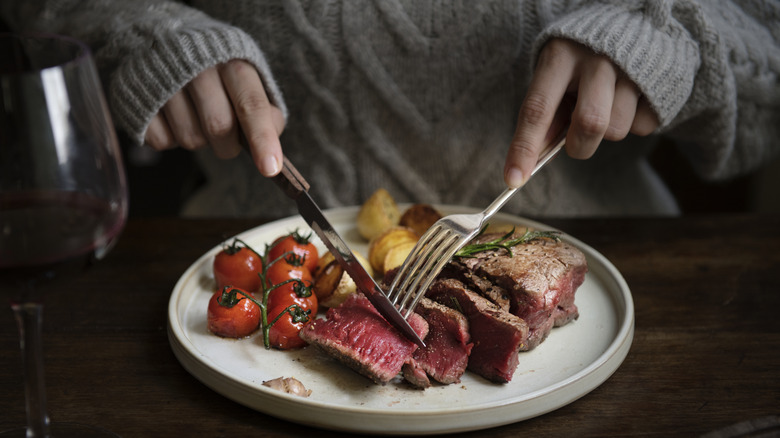The Protein Mistake That's Making You Dehydrated
Bodybuilders know how critical protein is to building strong muscles, but protein does so much more than that. On a cellular level, protein helps in the build and repair processes. You need protein in the form of enzymes to assist in digestion, contracting muscles, clotting muscles, and producing energy. Protein can also form hormones to signal information throughout your body. Want healthy skin and hair? You'll need protein for those, too.
Protein has so many benefits that you might reconsider going back to a high-protein diet. Eating protein at each meal will fill you up until your next meal because it reduces your hunger hormone and increases your satiety hormone. Although high-protein diets vary, most will have you eating between 0.6 and 0.9 grams of protein for each pound of body weight. If you weigh 150 pounds, that's 135 grams of protein on the top end. That's still about 27% of your total calories on a 2,000-calorie diet. While this might be doable in the short term, eating more than 0.9 grams of protein per pound (or 2 grams per kilogram) can leave you dehydrated.
Why protein can dehydrate you
Eating too many carbs can cause you to retain water because your body stores 3 grams of water with each gram of glycogen. On the other hand, eating too much protein can cause you to shed water. "The dehydration is caused by your kidneys working overtime to remove the excess protein as well as the nitrogen waste from metabolizing the protein," Culinary Health Solutions Chief Culinary Officer Ken Immer told The Healthy.
A high-protein diet can cause some subtle changes you might not notice, according to a 2006 article in the Journal of the Academy of Nutrition and Dietetics. Five men followed a high protein (3.6 grams per kilogram of body weight per day), moderate protein (1.8 grams per kilogram of body weight per day), and low protein (0.8 grams per kilogram of body weight per day) diet for 4 weeks each. The researchers noted hydration measures like blood urea nitrogen, plasma osmolality, urine-specific gravity, and fluid balance. Although the men's fluid balance remained the same with the three types of diets, the high-protein diet showed other measures of dehydration compared to the low- and moderate-protein diets.
You might not notice you're dehydrated
Dehydration can easily creep up on you, even if you don't feel thirsty. If you find yourself craving sugar, that's one sign you could be dehydrated. Your body needs water to release stored energy, and when you're dehydrated, you'll turn to quick sources of energy such as sugar. Dehydration might also explain your headaches and brain fog because your brain also stores water. Rather than reach for that late afternoon cup of coffee when you're tired, try drinking some water.
Dehydration can also mask itself as fatigue because your blood volume is reduced, meaning your heart needs to work harder. Bad breath and dry mouth are noticeable signs of dehydration, but you could also experience dry eyes because your tear ducts are dehydrated. Finally, if you can't figure out why those pounds don't come off, try drinking some more water. Your body needs water to stoke your metabolism and help shuttle toxins from your body.



